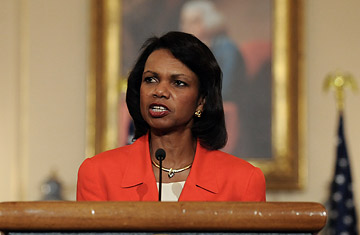
US Secretary of State Condoleezza Rice.
(14 of 17)
[Simultaneous conversation]
KRISTOL: He founded a government, a government and a country.
[Simultaneous conversation]
KRISTOL: Castro's Cuba was there before Castro, it'll be there after Castro.
ROSE: Governor?
CUOMO: Castro's achievement is survival in Cuba. I mean that by itself is a singular achievement. Surviving all these Presidents' effort there. But he hasn't had any influence beyond Cuba.
RATHER: I agree with that, Governor. I would be surprised the road is littered with the carcasses of people's reputations who tried to guess what Fidel Castro was going to do. I would be surprised if Castro himself didn't agree with this point to a certain extent. If you look past in the second half of the 20th century, in fact, the whole century I believe it to be true, I want to triple-check this, if Fidel Castro as both the head of government and head of State has had more, a longer continuous run than anyone. Yes, the Queen of England has had a long run but she's head of State, not of government. And that survivability would speak to him. I, myself, would not say he's the most influential person of the 20th century. If you're going to list 100 people, would you include Fidel Castro? If you're going to include Ho Chi Minh then you probably have to include Castro for the reasons that Walter spoke to. However, I see him shaking his head, no, so I don't think he agrees.
ISAACSON: I think Ho is more important.
RICE: I think Castro's problem is he lived too long. He lived to see his revolution born and he's lived to see it die. I, I cannot include on this list someone who sits off on a small island with a failed revolution, with a country falling down around him, with no influence internationally, who's great patron who was giving him $18 million a day to keep him in power, is also now on the ash-heap of history. I, I, I think —
[Simultaneous conversation]
RATHER: I think [unintelligible].
RICE: —he doesn't make, Fidel Castro doesn't make the cut.
RATHER: —the strongest argument against him is he played on a small turf.
RICE: Yes. And failed.
RATHER: However, I'm very uncomfortable with speaking up here this, but in terms of influence in this century, brought us to the closest point of a nuclear war that we've had in the '60s.
RICE: No, Nikita Khruschev did that. Fidel Castro provided the territory, the place to put the missiles.
RATHER: And urged him.
RICE: But it was Nikita Khruschev who took the great gamble and again, it goes back to whether power matters? And the reason that that mattered is that the Soviet Union actually was powerful. Fidel Castro is a, I would say, [unintelligible] of ours would say a minor figure in history. And if we were sitting here 50 years from now, these other names would come up, Fidel Castro might not.
ROSE: On that, in that context, is Ayatollah Khomeini a minor figure in the history of the 20th Century?
RICE: That remains to be seen. It depends, I think to what happens to fundamentalist Islam.
ROSE: Yeah, that's my point.
RICE: And theocracy.
ISAACSON: You see, I think the next great challenge towards the notion of liberty and democratic capitalism will be fundamentalism, a theocracy, Islamic fundamentalism and radical Islamic fundamentalism. And I think Khomeini is probably the representative of that and his influence is going to be with us through the next century.
CUOMO: Well, I would suggest and tell me what you think, the — I, I'm as afraid of fundamentalism as you are and one of the reasons is that I don't think it needs a Khomeini. I don't think it needs any individual spur like that. It is a powerful hold on people and it's growing in many parts of this world, including a little bit in this country. Because there is this vacuum of belief and people want simple ideas to guide themselves by. But I don't, I, I fundamentalism can do without Khomeini and that's why it's so treacherous.
ROSE: Do you still believe religion is a powerful idea of our time?
CUOMO: I think the country, the big question for the United States of America is how you describe what you intend to make of yourself? If you ask for the character, the personality of the United States we would tell ourselves we believe in liberty, we believe in opportunity, we believe in a sense of responsibility. And then the fourth word is, do you believe in community, family or individuality? Do you believe that the best you can do as a nation is free the path for the individual or do you believe the best you can do as a nation is to act as though you were a family? Which is to say that you help one another to achieve your maximum limits and you give up to do it. You sacrifice for the sake of the poor child, you sacrifice what you give one of the other children because he needs more. Is that the way we see ourselves? We don't know now. What's been very popular in recent years is to make fun of that idea of family and community on the grounds that we all know and that is my principal complaint with President Reagan, whom I loved personally. He made the denial of compassion respectable.
